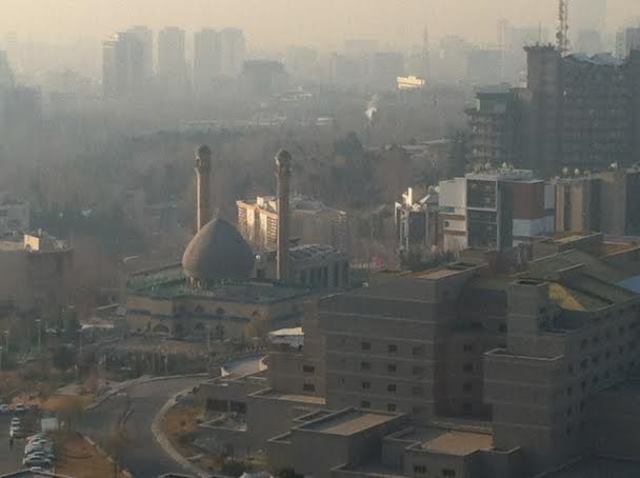By Jeff Brumley
A lot of things surprised McAfee School of Theology’s Robert Nash during an academic delegation to Tehran Jan. 21-23.
Surprises included being served name-brand American soda, feeling safer there than some places in the United States, and just how much being Baptist would help him during discussions with Iranian religious scholars.
But maybe the most astonishing was learning that the nation’s top cleric, Ali Khamenei, had issued a religious decree, or fatwa, prohibiting the creation or use of nuclear weapons.
“I don’t think most Americans know that,” said Nash, former global missions coordinator for the Cooperative Baptist Fellowship and associate dean and professor of missions and world religions at Mercer University’s McAfee School of Theology.
 He participated in a delegation of American scholars to Iran led by Conscience International founder James Jennings.
He participated in a delegation of American scholars to Iran led by Conscience International founder James Jennings.
The purpose was to meet with Iranian counterparts to discuss a wide range of topics and to make arrangements for future academic exchanges. The visit was made possible by recent diplomatic breakthroughs between Iran’s more moderate government and the United States.
Nash said he arrived home Jan. 26 encouraged that there are government and university officials in Iran who seem inclined to build on improved relations with the United States.
“I was surprised at the number of officials in the Iranian government that were trained and educated in American universities, with PhDs from places like UCLA, Boston University, Notre Dame — one after another,” he said.
Nash spoke with ABPnewsHerald about his experiences in Iran. Here is some of what he had to say.
How was the trip, overall?
It was absolutely unbelievable on so many levels. You can start with just the beauty of Tehran itself. You have these huge mountains with snow on them rising behind the city. It was immaculate. We were warmly greeted by people on the street. The program that the [Iran-based] Institute for Political and International Studies set up for us was amazing. This was a branch of the foreign ministry. We spent three hours with the chief Iranian negotiator in Geneva for controlling their nuclear program.
Did you ever fear for your safety?
Absolutely not. I felt safer in Terahn than I do in Atlanta. I felt comfortable venturing out on the street by myself. Most Iranians are younger than the ‘79 revolution, so their memory is sort of like the Vietnam is for us. Most folks were glad to see us and curious where we were from.
What was the most shocking or surprising thing you saw there?
I had the sense that the U.S. and UN sanctions would have had a profound effect on Tehran. I’ve been to Havana and I’ve seen pictures of North Korea and I sort of assumed in Tehran you would sense this economic oppression. But what we discovered essentially is a city that reminded me of Bucharest and Romania, an Eastern European capital. We were served Coca-Cola and Fanta orange …. Although in health care and social services for the poor folks — that is where the sanctions were having an impact.
And no harassment of any kind from authorities?
Not at all, but we were guests of an official government think tank and we had people with that think thank with us. Anything we asked for we were pretty much given.
What were the topics and frequency of the meetings you attended?
The first four days were pretty meeting intensive. We met with primarily think tanks and universities …. One interesting meeting was with the folks … charged with how to understand the Iranian revolution in history, so their questions have to do with the American Revolution …. They asked how do we give meaning and purpose to our identity as a nation, and what role did religion play in that.
How did you respond to that?
I talked about the Puritans and those Puritan mythologies of a chosen people, a city set on a hill, and how these mythologies have helped us to keep our moral compass.
Did your Baptist faith ever come to play a part in those discussions?
I mentioned Roger Williams a couple of times because Williams based his notions of religious freedom upon the sovereignty of God. I said because God is sovereign, I can’t violate God’s sovereignty by telling you what to believe. My point to them was that there is room for freedom of religion even if you espouse the sovereignty of God, and even if you hold the belief that your understanding of God is the right understanding.
Will there be future visits?
Yes. They are very interested in having religious leaders from the United States come out. So one of the things I am going to try to do is arrange a visit by U.S. religious leaders, and I am hoping to get a sampling of conservative and liberal religious leaders.
What’s your feeling about Iranian intentions on nuclear power and nuclear weapons?
That this is a moment of opportunity. [President] Hassan Rouhani is a moderate. He has a window of time, but there are forces in Iran who are ready to step in and fight against this opening and efforts to control its use of nuclear energy. On the U.S. side we have a president and secretary of state … who are willing to do things that no one has been willing to do in the past …. So there are also forces in favor of this peace and we have the opportunity to work alongside them to make it happen.
